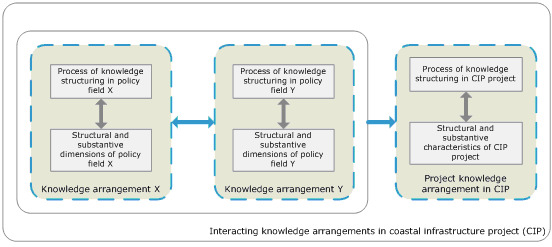Overview
A knowledge arrangement is a theoretical concept, which links the process of knowledge structuring and the characteristics of a particular policy field such as ‘water’ or ‘nature’. Following the ‘policy arrangement approach’ (see below), a policy field is characterized by three structural and one substantial dimension: actors and coalitions, rules and regulations, resources and discourse (Van Tatenhove et. al., 2000). Knowledge structuring relates to the entire process of asking knowledge questions, developing knowledge and using knowledge, and covering all forms (i.e. expert-, lay-, or bureaucratic knowledge) and types (e.g. reports, expertise or models) of knowledge that are valid within a particular policy field. In the situation of functional integration, several knowledge arrangements are confronted with each other and interact. As a result, a project knowledge arrangement emerges within the boundaries of the project. We expect that the type of project knowledge arrangement affects the potential for functional integration. In the figure below the process of confrontation and interaction among knowledge arrangements is illustrated.

